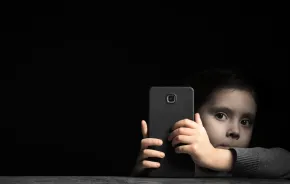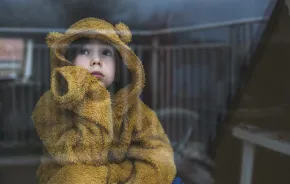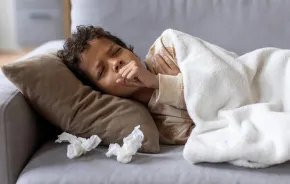
It’s that time of year again… the kids are back to school. For my family that means: waiting by the mailbox for teacher assignments, loading up on hundreds of dollars of school supplies and battles over back-to-school style.
I’m a feminist mom, raising feminist kids. And, every year there’s nothing that tests my values around bodily autonomy and consent more than back-to-school shopping.
Until they’re adults, it’s my job as a parent to make sure I protect and care for their bodies before they’re fully capable of doing so themselves. But when it comes to the rules I make for my kids about their bodies, clothes and style what’s parental protection and what’s patriarchy?
My husband and I have often recited the saying “your body, your choice” to our kids since they were little. As babies, strangers would need to ask to hold them, family and friends, to hug them. As toddlers, my kids often received opinions from teachers or friends about their mismatched outfits or choice of haircut.
Throughout it all, my husband and I have made it very clear that our kids were in charge of their own bodies. We want them to know they — and no one else — are in charge when it comes to their bodies.
But it’s easy to protect our kids from other people’s advances and requests, harder to uphold at the orthodontist office or in the statement tee section at Target. In the #MeToo era, it can be difficult to know how to be a more consent-conscious parent in day-to-day interactions with our kids. Here’s how my husband and I have decided to draw the line (for now).
Hygiene
When it comes to hygiene, I continue to be amazed that my kids don’t naturally want and enjoy being clean. Wearing clean clothes, brushing teeth and hair and taking a bath or shower all seem like major struggles around here. More than a few times, my kids have recited back to me “my body, my choice” as their argument for skipping the shower — not quite what we meant to teach them.
I’ve had to come to terms with the fact that protecting and caring for my kids includes protecting them from themselves. If by adulthood they no longer have any teeth... well, they’ll likely be mad at me for not insisting on the importance of personal hygiene.
But short of permanent damage, I’ve learned to take the advice I learned from Seattle Children’s Hospital “Great Conversations” founder, Julie Metzger, in a talk she gave at my kids’ elementary school.
When a mom in the crowd asked what to do about her son who refused to wear socks and has stinky feet as a result, Metzger suggested letting kids be (reasonably) stinky. At some point, she argued, their peers’ reactions to their hygiene — or lack there of — will likely change their habits.
Ever since, I’ve followed the advice with my older kids, and, to my surprise, it’s worked. As a rising seventh-grader, my daughter now miraculously cares about showers, deodorant and wearing different clothes every day — no power struggle required.
Personal style
I know it’s different for everyone, but for me, if it’s temporary, I’m much more likely to allow my kids to do it. We’ve experimented with everything from wacky haircuts to pastel-colored hair dye to temporary tattoos. To me, these things are nothing more than harmless fun.
Where I draw the line? Makeup and objectifying clothing. I have 3 daughters and one son. My kids are still young, and for now, I’ve said no to both but for different reasons than the ones I was given growing up.
When I was a kid, “modesty” was touted as the reason I couldn’t wear “suggestive” clothes or make-up. As an adult, I now believe the concept of modesty and “suggestive” clothing perpetuate rape culture.
Though my youngest two (a daughter and a son) really don’t ask for anything that would push me to reconsider my preconceived boundaries, it’s sometimes challenging for me to give good answers when my older two daughters ask for a skirt I think is too short or ask to wear caked-on layers of bright makeup out in public.
For now, I’ve told my girls that I think kids should be kids for as long as possible and while clothing and makeup can be fun, they can also be used as a way to objectify and sexualize, a reality that's particularly true for young girls.
Piercings
My mom had my ears pierced when I was still a toddler. And, in part, that decision was cultural. So though I feel fine about my own piercings, by the time my husband and I became parents, we decided we wanted our children to have the right to consent to cosmetic body alterations.
As a result, none of my own kids have body piercings; we’ve even opted against circumcision for our son. Still, I’ve wondered, at what age are my children capable of consenting to body piercings or tattoos?
We’ve decided for piercings, which are semi-permanent, we’re open to our kids’ getting them when and if they’re ready. For tattoos, which are harder to alter or remove, they’ll have to wait until they’re 18 and can no longer blame us for that regrettable SpongeBob Squarepants rendering on their forearm.
Body-altering medications and surgeries
I know, this one seems far-fetched. But, it isn’t. My own daughter has made it clear she doesn’t want orthodontic work (though her dental team highly recommends it). It’s also becoming increasingly common for kids to get cosmetic surgery.
And don’t even get me started on this article, which brings up concerns related to medical interventions for trans children. As parents, where do we draw the line? I honestly don’t know.
But I do know this: I want all four of my kids to be healthy and confident in their bodies.
I want them to receive messages about their bodies that are positive. I want them to know that they and they alone own their bodies. I want them to know that their gender should not be a limitation on how they get use or enjoy their bodies. I want them to feel empowered to ask for and demand consent. And ultimately, I want them to feel that their dad and I have worked to raise them in a way that supports these goals.











